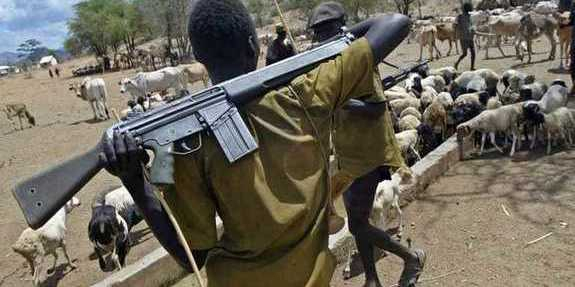A violent confrontation erupted in the dense forests of Yenagoa, Bayelsa State, as heavily armed herders engaged in a fierce battle with security forces, leaving local residents on edge and intensifying concerns over the region’s security. The clash, which occurred on Tuesday, has raised alarm about the growing tension surrounding anti-grazing laws and the safety of nearby communities, further deepening an ongoing issue in the region.
The incident took place in the remote areas of the Yenagoa forest, a known location for grazing activities. Reports indicate that a group of armed herders clashed with security personnel deployed to enforce the state’s anti-grazing laws. These laws were introduced by Bayelsa State to curb the destructive effects of open grazing, which has led to conflicts between farmers and herders over land usage, crop destruction, and violence in past years.
Eyewitnesses reported hearing loud gunshots and seeing a heavy presence of security forces, including soldiers and members of the local vigilante groups, engaged in a fierce gun battle with the herders. The exchange of fire lasted several hours, with the herders reportedly firing at the security forces while trying to defend themselves and their herds.
A video of the confrontation quickly surfaced on social media, showing the scale of the violence and the ongoing conflict between the two groups. The video has sparked widespread concern among residents of Yenagoa, as well as Nigerians across the country, with many fearing that the violent incident could escalate further.
The issue of open grazing has been a persistent challenge across Nigeria, especially in the southern regions, where farmers often face clashes with herders who move cattle through farmland. These clashes have been worsened by the destruction of crops, as well as the violent confrontations between herders and local communities. In response to these issues, several states, including Bayelsa, have enacted anti-grazing laws to regulate and restrict open grazing practices.
In Bayelsa State, these laws have been met with strong opposition from some herders, who argue that the laws infringe on their traditional rights to freely move their cattle. The enforcement of these laws has been a source of tension, with clashes between herders and security forces becoming more frequent in recent months.
In addition to the local disputes, the broader issue of herders moving cattle across regions has been linked to the rise in violence and kidnappings in some parts of the country. The herders are often accused of being part of larger networks that are involved in criminal activities such as banditry and kidnapping for ransom.
The clash in Yenagoa has triggered mixed reactions from residents and various interest groups. Some local farmers expressed relief that security forces were finally taking action against what they called the “uncontrolled grazing practices” of the herders. “For years, our crops have been destroyed, and our families have lived in fear of these herders. It is good that the government is taking a stand, but we need more to be done to stop the violence,” said a local farmer who wished to remain anonymous.
On the other hand, some herders have criticized the enforcement of the anti-grazing laws, claiming that they are being unfairly targeted and forced to operate in an increasingly hostile environment. “We are just trying to feed our families and take care of our cattle. The government should create more grazing areas for us, instead of sending security forces to chase us away,” said one of the herders involved in the conflict, speaking on the condition of anonymity.
Human rights groups have also weighed in on the issue, with some calling for a more peaceful resolution to the conflict and urging both sides to engage in dialogue. “Violence only begets more violence. We must find ways to address the root causes of the clashes, such as the lack of grazing areas and the poverty faced by many herders,” said a representative from the Nigerian Human Rights Commission. “We urge the government to facilitate peaceful negotiations between all parties involved.”
In response to the violence, the Bayelsa State government has vowed to take stronger measures to enforce the anti-grazing laws while also ensuring the safety and security of all citizens. The state’s security forces have been tasked with monitoring the forests and other vulnerable areas to prevent further clashes and maintain law and order.
The Bayelsa State Commissioner for Information, Mr. Daniel Iworiso-Markson, addressed the media following the violence, stating that the government remains committed to ensuring peace in the state. “We will not allow any group to undermine the peace and security of our people. The anti-grazing laws are in place to protect both farmers and herders, and we will continue to ensure they are enforced,” he said.
However, the situation remains complex, as many believe that the root cause of the conflict is the lack of proper infrastructure for grazing and the limited grazing reserves available to herders. Critics argue that without addressing these fundamental issues, the tensions between farmers, herders, and security forces will continue to escalate.
As tensions remain high in Yenagoa and other parts of Bayelsa, there are growing calls for dialogue between herders, farmers, and government officials. Stakeholders are urging all parties to come together to find a long-term solution to the problem of open grazing. This would involve not only enforcing anti-grazing laws but also ensuring that herders have access to designated grazing areas where their cattle can be fed without encroaching on farmlands.

